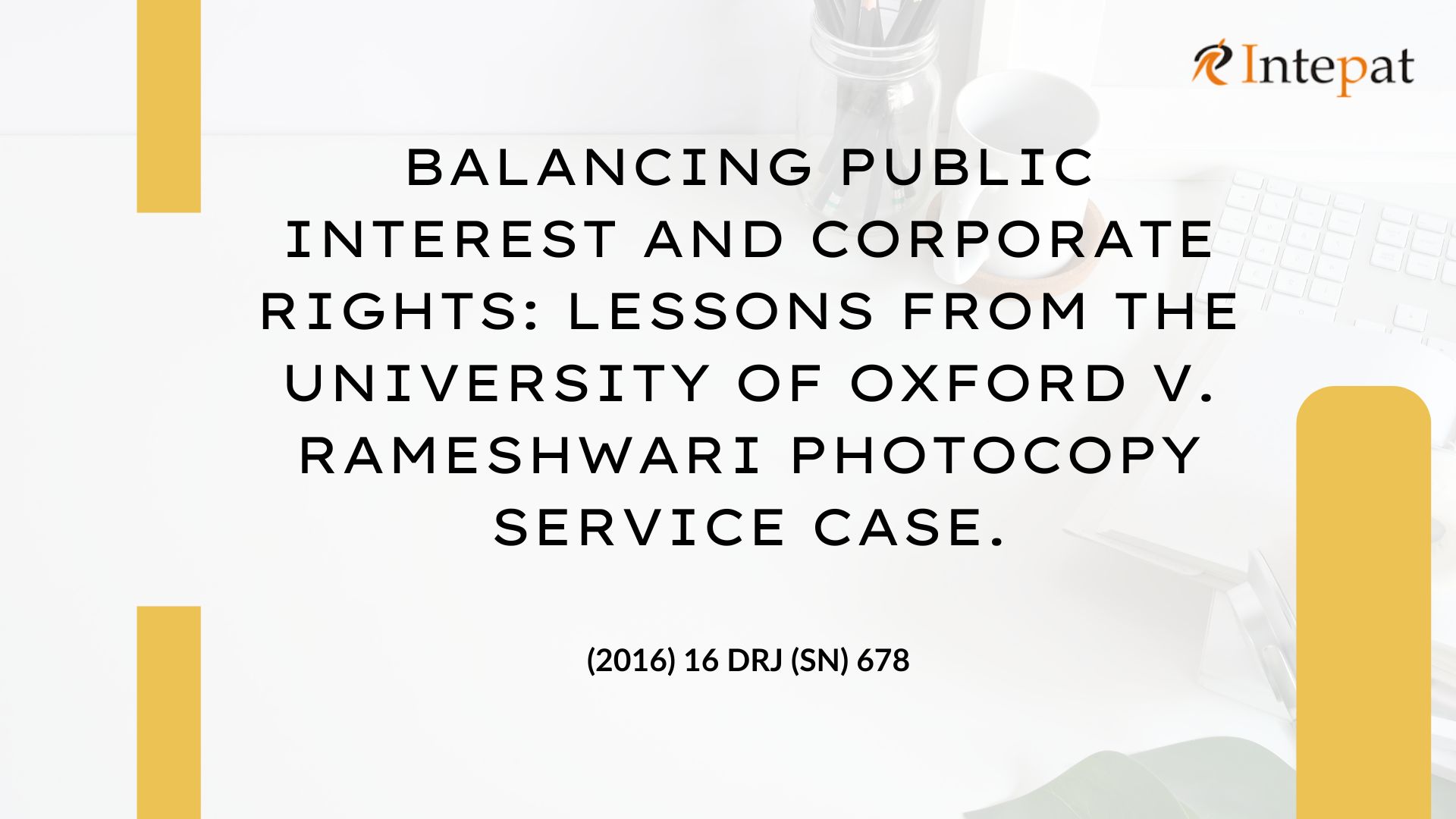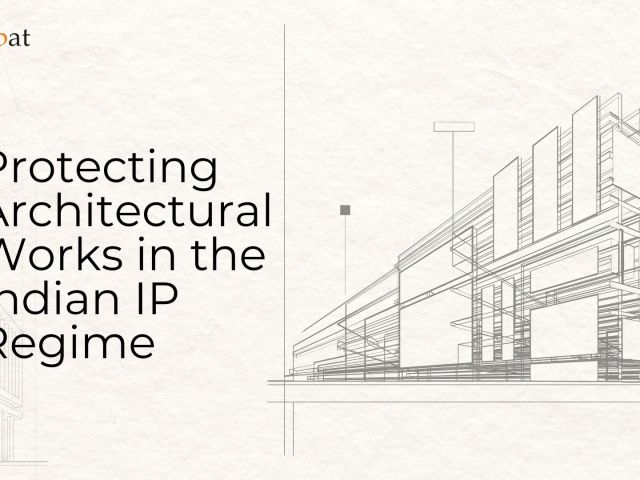Introduction
Intellectual property laws are generally divided into industrial property and copyright. While copyright is distinct from other forms of intellectual property by focusing on personal rights, its primary role is to manage and protect knowledge. In the spirit of advancing public welfare, it is essential that knowledge remain accessible and is not unfairly withheld.
However, copyright owners sometimes adopt an overly strict approach, which can disrupt the balance between protecting intellectual property and serving the public interest. Courts have often intervened in such scenarios to address instances where copyright owners have sought to commercialize their work to an extent that undermines public access and educational opportunities. A notable example is the case of The Chancellor, Masters & Scholars of the University of Oxford & Ors. v. Rameshwari Photocopy Services & Anr. (2016). In this pivotal case, the court reinforced the educational rights of students, striking a crucial balance against the excessive commercial exploitation of copyright by publishers. This decision was a significant moment in ensuring that the pursuit of profit does not impede the public’s right to access essential educational resources.
Background of the case
Rameshwari Photocopy Service is a photocopy shop situated on the Delhi School of Economics (DSE) campus, and they provide course materials to students. The course materials comprised pages compiled from various expensive books that the students couldn’t afford, but they had to read it for the purpose of their examination. Delhi University, which is a public university, has students from all sections of the society, and not everyone could afford to buy books, so the course packs were a lifesaver for them. Everything was going well until 2012 when University Press, Cambridge University Press (UK), and Taylor & Francis Group (UK), as well as Cambridge University Press India Pvt. Ltd. and Taylor & Francis Books India Pvt. Ltd., filed a copyright infringement lawsuit against Rameshwari Photocopy Service and the University of Delhi for allegedly infringing their copyrighted content and distributing the course packs without any license from the publishers.
Initially, Rameshwari Photocopy Service and the University of Delhi stood as the primary defendants in the case. On October 17, 2012, the Delhi High Court issued an interim injunction that halted Rameshwari Photocopy Service from producing or selling the crucial course packs. This ruling struck a heavy blow to students who relied on these affordable materials for their education.
The lawsuit quickly sparked widespread support from students and scholars, who rallied to defend their right to access affordable education. In response to the growing concern over the impact on students’ ability to obtain essential materials, the Association for Students for Equitable Access to Knowledge (ASEAK) and the Society for Promoting Equitable Access to Knowledge (SPEAK) impleaded as necessary partiesin the case. Their participation highlighted the crucial fight for equitable access to educational resources, emphasizing the importance of ensuring that all students can access the materials they need for their studies.
The publishers’ decision to pursue the case faced significant backlash, so much so that even the authors of the works in question intervened. In March 2013, over 309 renowned authors and academics from around the world wrote to the publishers, urging them to withdraw the lawsuit. Notably, 33 of these signatories were directly involved with the plaintiff-publishers and were creators of the very works allegedly infringed by Delhi University and its photocopy service.
Finally, after a prolonged battle, the division bench of the Delhi High Court ultimately lifted the initial injunction it had imposed on the plaintiffs. This pivotal decision allowed Rameshwari Photocopy Services to resume selling its course bundles.
Following the Delhi High Court’s judgement, students, alumni, and various scholars from Oxford University urged the Oxford University Press not to appeal the decision to the Supreme Court. As a result, the three publishersOxford University Press, Cambridge University Press (UK), and Taylor & Francis Groupdecided to withdraw their lawsuit and choose not to pursue an appeal.
However, the Indian Reprographic Rights Organization (IRRO), a copyright society that had been involved as one of the plaintiffs, petitioned the Supreme Court to challenge the Delhi High Court’s decision. The Supreme Court dismissed the petition, noting that the original lawsuit had been filed by the publishers, who had since withdrawn their claim. Consequently, the IRRO, having no direct stake in the case, was not entitled to continue the legal battle.
Argument by the parties
Plaintiff
The plaintiff contended that by printing scanned copies of their published books, Rameshwari Photocopy Service had infringed upon their copyright. They argued that Rameshwari was unlawfully profiting from these infringing copies, thereby undermining the rights of authors and publishers. Furthermore, the plaintiff emphasized that since the photocopy shop was responsible for issuing these copies, it could not shield itself under the provisions of Section 52(1)(i), which only permitted teachers and students to reproduce works for educational purposes.
Instead, the plaintiff asserted that Section 52(1)(h) should apply, allowing for the reproduction of up to two passages from works by the same author published by the same publisher within a five-year period. To continue selling these courses packs legally, they argued that the defendant must obtain a license and pay royalties to the Indian Reprographic Rights Organization.
Defendant’s Argument
The defendant argued that they charged minimal fees for printing course packs, emphasizing that their service was designed for the benefit of students. They claimed they were not competing with publishers, as most of their students came from economically disadvantaged backgrounds and could not afford expensive textbooks for their examinations. Rameshwari Photocopy Service maintained that it only scanned the necessary parts from the books, rather than reproducing entire texts. The shop owner of Rameshwari Photocopy Service stated, “If a student needed 33 readings for a course like Agrarian Sociology, it could take months to collect the readings from different books. I make life easier for students by providing all the relevant materials in a compiled course pack.”
The University of Delhi supported the defendant’s position, arguing that the Berne Convention and the TRIPS Agreement allowed for exceptions in copyright law for educational institutions. They had granted a license to Rameshwari Photocopy Service to operate on campus, which permitted the provision of course packs for students under the educational exceptions outlined in Section 51 of the Copyright Act.
Organizations like ASEAK and SPEAK argued that the shop was providing only the essential content from the books, not the entire texts. Their stance was that if Rameshwari Photocopy Service were forced to stop printing these course packs, it would significantly hinder students, who could not afford to buy all the necessary books. They asserted that Section 52 should be interpreted broadly, emphasizing that the purpose of copyright law is to foster knowledge within society rather than monopolize commercial rights. They further contended that Section 52(1)(i) should apply to third parties, not just to teachers and students.
The Key Legal Principle Used
The main provision that was used by the defendants in this case was Section 52(1) (i), which talks about fair dealing,i.e.,certain acts that do not constitute copyright infringement. Section 52(1) (i) is a key provision that highlights the importance of fair use in education. It specifically allows for the reproduction of copyrighted material by teachers and students in educational settings. This means that whether it’s using excerpts of a work for classroom instruction, including them in exam questions, or providing answers based on such material, it all falls under the umbrella of fair dealing. This provision ensures that educational activities can proceed smoothly without legal hindrances, balancing the need to respect copyright with the practical needs of teaching and learning.
Balancing Pubic Interest
The decision by the Delhi High Court’s division bench illustrates that when it comes to serving the public interest or advancing educational purposes, the principle of fair use can allow for the use of more than just a limited portion of a copyrighted work and that it can be made applicable beyond just students and teachers. This landmark judgement underscores that copyright law is designed to strike a balance between protecting the rights of creators and serving the broader needs of the public. It affirms that while copyright safeguards intellectual property, it must also accommodate the essential requirement of access to educational resources, ensuring that corporate interests do not overshadow public benefit.
Conclusion
The decision by the division bench of the Delhi High Court made it clear that copyright law must balance the rights of copyright owners with the public interest. This landmark case saw widespread support from across the educational community, including authors, scholars, students, and teachers, all rallying to safeguard the interests of students. The ruling establishes a significant precedent for interpreting copyright law in a way that aligns with broader societal goals. It underscores the necessity of a balanced approach that avoids prioritizing corporate interests at the expense of the public good. This judgement reinforces the idea that while intellectual property rights are crucial, they should not hinder the equitable distribution of knowledge. Such equitable access is essential for fostering an informed and educated society.
Authored by Debapom Purkayastha, an assessment intern @ Intepat IP




